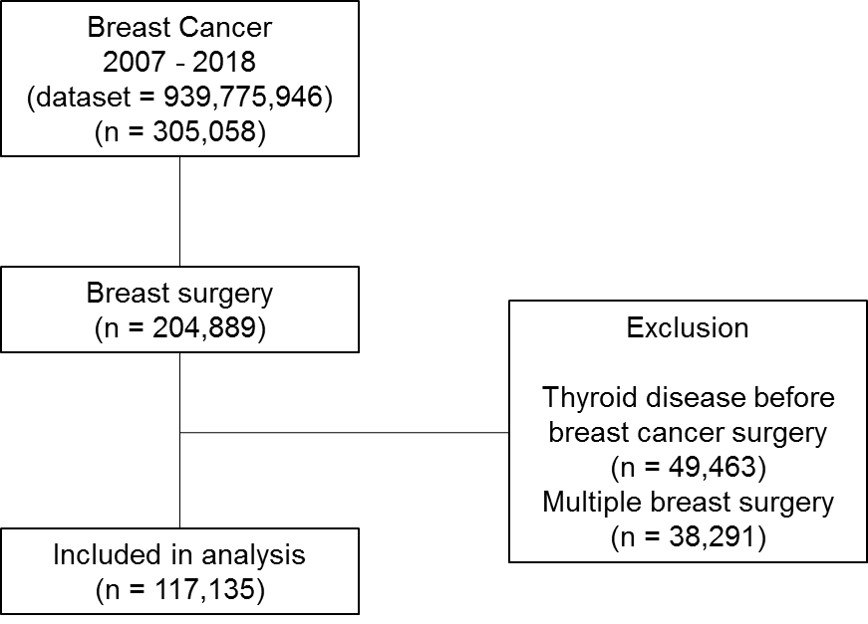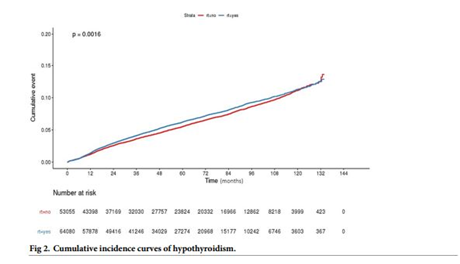글로벌 연구동향
방사선종양학
- 2022년 08월호
[PLoS One.] Incidence of hypothyroidism after treatment for breast cancer: A Korean population-based study부산의대 / 박종무, 주지현*
- 출처
- PLoS One.
- 등재일
- 2022 Jun 16
- 저널이슈번호
- 17(6):e0269893. doi: 10.1371/journal.pone.0269893. eCollection 2022.
- 내용
Abstract
This Korean population-based study aimed to describe the patterns of hypothyroidism after adjuvant radiation therapy (RT) in patients with breast cancer. The Korean Health Insurance Review and Assessment Service database was searched for patients with invasive breast carcinomas. We calculated the cumulative incidence and incidence rates per 1,000 person-years of subsequent hypothyroidism and compared them using the log-rank test and the Cox proportional hazards model. Between 2007 and 2018, 117,135 women diagnosed with breast cancer with a median follow-up time of 4.6 years were identified. The 8-year incidence of hypothyroidism was 9.3% in patients treated with radiation and 8.6% in those treated without radiation (p = 0.002). The incidence rates per 1,000 person-years in the corresponding treatment groups were 6.2 and 5.7 cases, respectively. The hazard ratio (HR) in patients receiving RT was 1.081 (95% confidence interval [CI], 1.013-1.134; p = 0.002). After mastectomy, RT showed a trend toward a higher risk of hypothyroidism (HR = 1.248; 95% CI, 0.977-1.595; p = 0.076). Our study provides one of the largest population-based data analyses regarding the risk of hypothyroidism among Korean patients with breast cancer. The adjusted risk for patients treated with RT exceeded that for patients with breast cancer treated without RT. The effect was evident immediately after treatment and lasted up to approximately 9 years.

Affiliations
Jongmoo Park 1 , Choongrak Kim 2 , Yongkan Ki 3 4 , Wontaek Kim 3 5 , Jiho Nam 5 , Donghyun Kim 3 5 , Dahl Park 5 , Hosang Jeon 4 , Dong Woon Kim 4 , Ji Hyeon Joo 3 4
1 Department of Radiation Oncology, School of Medicine, Kyungpook National University, Daegu, Korea.
2 Department of Statistics, Pusan National University, Busan, Korea.
3 Department of Radiation Oncology, Pusan National University School of Medicine, Yangsan, Korea.
4 Department of Radiation Oncology, Pusan National University Yangsan Hospital, Yangsan, Korea.
5 Department of Radiation Oncology, Pusan National University Hospital, Busan, Korea.
- 연구소개
- 건강보험심사평가원 보건의료정보를 활용한 연구로, 한국 유방암 환자에서 갑상선 기능 저하증의 발병 양상을 조사하였습니다. 방사선 치료를 받은 유방암 환자는 받지 않은 환자에 비해 갑상선 기능 저하증의 발병 위험이 높은 것이 확인되었습니다. 치료 계획 및 추적 관찰 단계에서 임상의들에게 도움이 될 만한 정보라 생각합니다.
- 덧글달기
- 이전글 [Korean J Gastroenterol.] Neutrophil to Lymphocyte Ratio and Platelet to Lymphocyte Ratio in Hepatocellular Carcinoma Treated with Stereotactic Body Radiotherapy
- 다음글 [Radiother Oncol.] Effect of the biologically effective dose of electron beam radiation therapy on recurrence rate after keloid excision: A meta-analysis








편집위원
심평원 자료를 이용하여 유방암 방사선치료 후 갑상선기능저하증의 빈도를 분석한 논문으로, 방사선치료를 받은 경우 HR가 1.081로 통계적으로 유의한 상관관계를 보였음
덧글달기닫기2022-08-02 13:03:42
등록
편집위원2
유방암환자에서 방사선치료 후 갑상선기능저하증이 발생할 위험성이 시간이 경과함에 따라 계속 증가하는 것을 보여준 흥미로운 연구로 건강보험 자료 특성상 RT dose, field, systemic Tx 연관성 등은 추가 연구가 필요합니다.
덧글달기닫기2022-08-02 14:22:13
등록